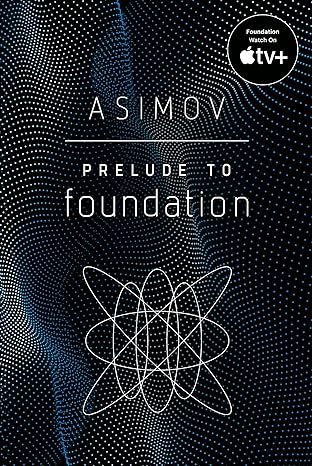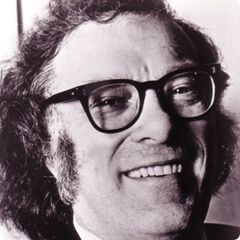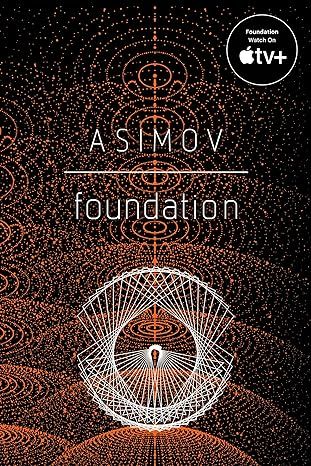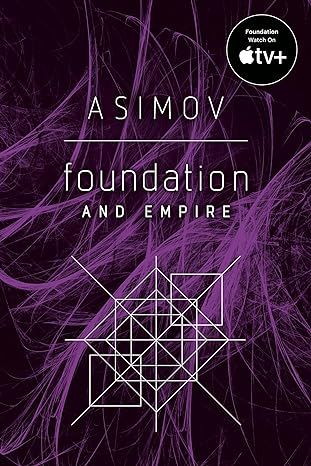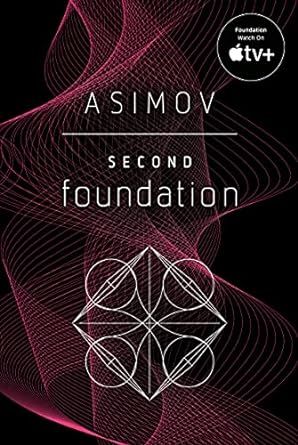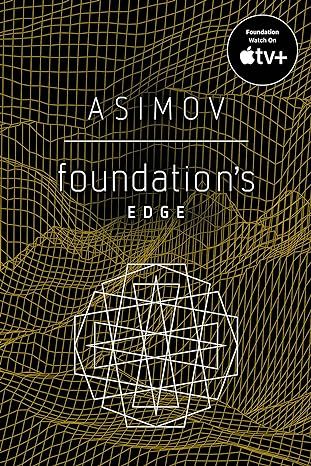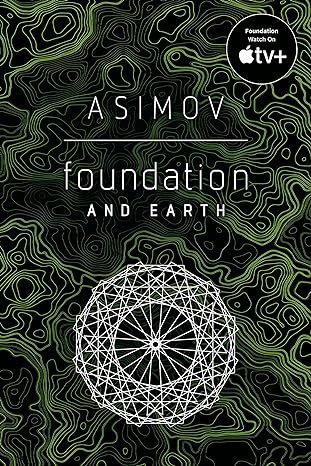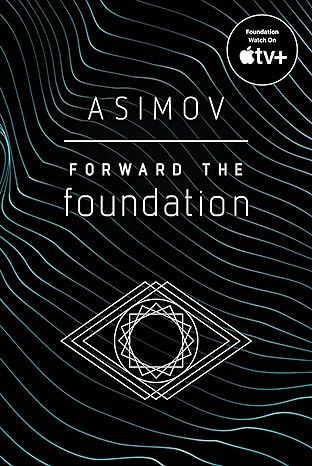Prelude to FoundationKindle
4.6
-
6,057 ratings
The first of two prequel novels in Isaac Asimov’s classic science-fiction masterpiece, the Foundation series
THE EPIC SAGA THAT INSPIRED THE APPLE TV+ SERIES FOUNDATION
It is the year 12,020 G.E. and Emperor Cleon I sits uneasily on the Imperial throne of Trantor. Here in the great multidomed capital of the Galactic Empire, forty billion people have created a civilization of unimaginable technological and cultural complexity. Yet Cleon knows there are those who would see him fall—those whom he would destroy if only he could read the future.
Hari Seldon has come to Trantor to deliver his paper on psychohistory, his remarkable theory of prediction. Little does the young Outworld mathematician know that he has already sealed his fate and the fate of humanity. For Hari possesses the prophetic power that makes him the most wanted man in the Empire . . . the man who holds the key to the future—an apocalyptic power to be known forever after as the Foundation.
Kindle
$8.99
Available instantly
Audiobook
$0.00
with membership trial
School & Library Binding
$19.80
Paperback
$9.47
Ships from
Amazon.com
Payment
Secure transaction
ISBN-10
0008117489
ISBN-13
978-0008117481
Print length
405 pages
Language
English
Publisher
HarperVoyager; Spectra
Publication date
December 31, 2015
Dimensions
5.08 x 1.02 x 7.8 inches
Item weight
9.2 ounces
Frequently bought together
Product details
ASIN :
B003EY7JH6
File size :
9012 KB
Text-to-speech :
Enabled
Screen reader :
Supported
Enhanced typesetting :
Enabled
Word wise :
Enabled
Sample
CLEON I -- . . . The last Galactic Emperor of the Entun dynasty. He was born in the year 11,988 of the Galactic Era, the same year in which Hari Seldon was born. (It is thought that Seldon's birthdate, which some consider doubtful, may have been adjusted to match that of Cleon, whom Seldon, soon after his arrival on Trantor, is supposed to have encountered.)
Having succeeded to the Imperial throne in 12,010 at the age of twenty-two, Cleon I's reign represented a curious interval of quiet in those troubled times. This is undoubtedly due to the skills of his Chief of Staff, Eto Demerzel, who so carefully obscured himself from public record that little is known about him.
Cleon himself . . .
ENCYCLOPEDIA GALACTICA
1
Suppressing a small yawn, Cleon said, "Demerzel, have you by any chance ever heard of a man named Hari Seldon?"
Cleon had been Emperor for just over ten years and there were times at state occasions when, dressed in the necessary robes and regalia, he could manage to look stately. He did so, for instance, in the holograph of himself that stood in the niche in the wall behind him. It was placed so that it clearly dominated the other niches holding the holographs of several of his ancestors.
The holograph was not a totally honest one, for though Cleon's hair was light brown in hologram and reality alike, it was a bit thicker in the holograph. There was a certain asymmetry to his real face, for the left side of his upper lip raised itself a bit higher than the right side, and this was somehow not evident in the holograph. And if he had stood up and placed himself beside the holograph, he would have been seen to be 2 centimeters under the 1.83-meter height that the image portrayed--and perhaps a bit stouter.
Of course, the holograph was the official coronation portrait and he had been younger then. He still looked young and rather handsome, too, and when he was not in the pitiless grip of official ceremony, there was a kind of vague good nature about his face.
Demerzel said, with the tone of respect that he carefully cultivated, "Hari Seldon? It is an unfamiliar name to me, Sire. Ought I to know of him?"
"The Minister of Science mentioned him to me last night. I thought you might."
Demerzel frowned slightly, but only very slightly, for one does not frown in the Imperial presence. "The Minister of Science, Sire, should have spoken of this man to me as Chief of Staff. If you are to be bombarded from every side--"
Cleon raised his hand and Demerzel stopped at once. "Please, Demerzel, one can't stand on formality at all times. When I passed the Minister at last night's reception and exchanged a few words with him, he bubbled over. I could not refuse to listen and I was glad I had, for it was interesting."
"In what way interesting, Sire?"
"Well, these are not the old days when science and mathematics were all the rage. That sort of thing seems to have died down somehow, perhaps because all the discoveries have been made, don't you think? Apparently, however, interesting things can still happen. At least I was told it was interesting."
"By the Minister of Science, Sire?"
"Yes. He said that this Hari Seldon had attended a convention of mathematicians held here in Trantor--they do this every ten years, for some reason--and he said that he had proved that one could foretell the future mathematically."
Demerzel permitted himself a small smile. "Either the Minister of Science, a man of little acumen, is mistaken or the mathematician is. Surely, the matter of foretelling the future is a children's dream of magic."
"Is it, Demerzel? People believe in such things."
"People believe in many things, Sire."
"But they believe in such things. Therefore, it doesn't matter whether the forecast of the future is true or not. If a mathematician should predict a long and happy reign for me, a time of peace and prosperity for the Empire-- Eh, would that not be well?"
"It would be pleasant to hear, certainly, but what would it accomplish, Sire?"
"But surely if people believe this, they would act on that belief. Many a prophecy, by the mere force of its being believed, is transmuted to fact. These are 'self-fulfilling prophecies.' Indeed, now that I think of it, it was you who once explained this to me."
Demerzel said, "I believe I did, Sire." His eyes were watching the Emperor carefully, as though to see how far he might go on his own. "Still, if that be so, one could have any person make the prophecy."
"Not all persons would be equally believed, Demerzel. A mathematician, however, who could back his prophecy with mathematical formulas and terminology, might be understood by no one and yet believed by everyone."
Demerzel said, "As usual, Sire, you make good sense. We live in troubled times and it would be worthwhile to calm them in a way that would require neither money nor military effort--which, in recent history, have done little good and much harm."
"Exactly, Demerzel," said the Emperor with excitement. "Reel in this Hari Seldon. You tell me you have your strings stretching to every part of this turbulent world, even where my forces dare not go. Pull on one of those strings, then, and bring in this mathematician. Let me see him."
"I will do so, Sire," said Demerzel, who had already located Seldon and who made a mental note to commend the Minister of Science for a job well done.
Hari Seldon did not make an impressive appearance at this time. Like the Emperor Cleon I, he was thirty-two years old, but he was only 1.73 meters tall. His face was smooth and cheerful, his hair dark brown, almost black, and his clothing had the unmistakable touch of provinciality about it.
To anyone in later times who knew of Hari Seldon only as a legendary demigod, it would seem almost sacrilegious for him not to have white hair, not to have an old lined face, a quiet smile radiating wisdom, not to be seated in a wheelchair. Even then, in advanced old age, his eyes had been cheerful, however. There was that.
And his eyes were particularly cheerful now, for his paper had been given at the Decennial Convention. It had even aroused some interest in a distant sort of way and old Osterfith had nodded his head at him and had said, "Ingenious, young man. Most ingenious." Which, coming from Osterfith, was satisfactory. Most satisfactory.
But now there was a new--and quite unexpected--development and Seldon wasn't sure whether it should increase his cheer and intensify his satisfaction or not.
He stared at the tall young man in uniform--the Spaceship-and-Sun neatly placed on the left side of his tunic.
"Lieutenant Alban Wellis," said the officer of the Emperor's Guard before putting away his identification. "Will you come with me now, sir?"
Wellis was armed, of course. There were two other Guardsmen waiting outside his door. Seldon knew he had no choice, for all the other's careful politeness, but there was no reason he could not seek information. He said, "To see the Emperor?"
"To be brought to the Palace, sir. That's the extent of my instructions."
"But why?"
"I was not told why, sir. And I have my strict instructions that you must come with me--one way or another."
"But this seems as though I am being arrested. I have done nothing to warrant that."
"Say, rather, that it seems you are being given an escort of honor--if you delay me no further."
Seldon delayed no further. He pressed his lips together, as though to block off further questions, nodded his head, and stepped forward. Even if he was going to meet the Emperor and to receive Imperial commendation, he found no joy in it. He was for the Empire--that is, for the worlds of humanity in peace and union--but he was not for the Emperor.
The lieutenant walked ahead, the other two behind. Seldon smiled at those he passed and managed to look unconcerned. Outside the hotel they climbed into an official ground-car. (Seldon ran his hand over the upholstery; he had never been in anything so ornate.)
They were in one of the wealthiest sections of Trantor. The dome was high enough here to give a sensation of being in the open and one could swear--even one such as Hari Seldon, who had been born and brought up on an open world--that they were in sunlight. You could see no sun and no shadows, but the air was light and fragrant.
And then it passed and the dome curved down and the walls narrowed in and soon they were moving along an enclosed tunnel, marked periodically with the Spaceship-and-Sun and so clearly reserved (Seldon thought) for official vehicles.
A door opened and the ground-car sped through. When the door closed behind them, they were in the open--the true, the real open. There were 250 square kilometers of the only stretch of open land on Trantor and on it stood the Imperial Palace. Seldon would have liked a chance to wander through that open land--not because of the Palace, but because it also contained the Galactic University and, most intriguing of all, the Galactic Library.
And yet, in passing from the enclosed world of Trantor into the open patch of wood and parkland, he had passed into a world in which clouds dimmed the sky and a chill wind ruffled his shirt. He pressed the contact that closed the ground-car's window.
It was a dismal day outside.
Read more
About the authors
Isaac Asimov
Isaac Asimov was an American author and professor of biochemistry at Boston University, best known for his works of science fiction and for his popular science books. Asimov was prolific and wrote or edited more than 500 books and an estimated 90,000 letters and postcards. His books have been published in 9 of the 10 major categories of the Dewey Decimal Classification.
Asimov wrote hard science fiction and, along with Robert A. Heinlein and Arthur C. Clarke, he was considered one of the "Big Three" science fiction writers during his lifetime. Asimov's most famous work is the Foundation Series; his other major series are the Galactic Empire series and the Robot series. The Galactic Empire novels are explicitly set in earlier history of the same fictional universe as the Foundation series. Later, beginning with Foundation's Edge, he linked this distant future to the Robot and Spacer stories, creating a unified "future history" for his stories much like those pioneered by Robert A. Heinlein and previously produced by Cordwainer Smith and Poul Anderson. He wrote hundreds of short stories, including the social science fiction "Nightfall", which in 1964 was voted by the Science Fiction Writers of America the best short science fiction story of all time. Asimov wrote the Lucky Starr series of juvenile science-fiction novels using the pen name Paul French.
Read more
Top Isaac Asimov titles
View allBest sellers
View all
The Tuscan Child
4.2
-
100,022
$8.39

The Thursday Murder Club: A Novel (A Thursday Murder Club Mystery)
4.3
-
155,575
$6.33

Sapiens: A Brief History of Humankind
4.6
-
140,302
$13.49

The Butterfly Garden (The Collector, 1)
4.3
-
88,556
$9.59

Things We Hide from the Light (Knockemout Series, 2)
4.4
-
94,890
$11.66

The Last Thing He Told Me: A Novel
4.3
-
154,085
$2.99

The Perfect Marriage: A Completely Gripping Psychological Suspense
4.3
-
143,196
$9.47

The Coworker
4.1
-
80,003
$13.48

First Lie Wins: A Novel (Random House Large Print)
4.3
-
54,062
$14.99

Mile High (Windy City Series Book 1)
4.4
-
59,745
$16.19

Layla
4.2
-
107,613
$8.99

The Locked Door
4.4
-
94,673
$8.53
